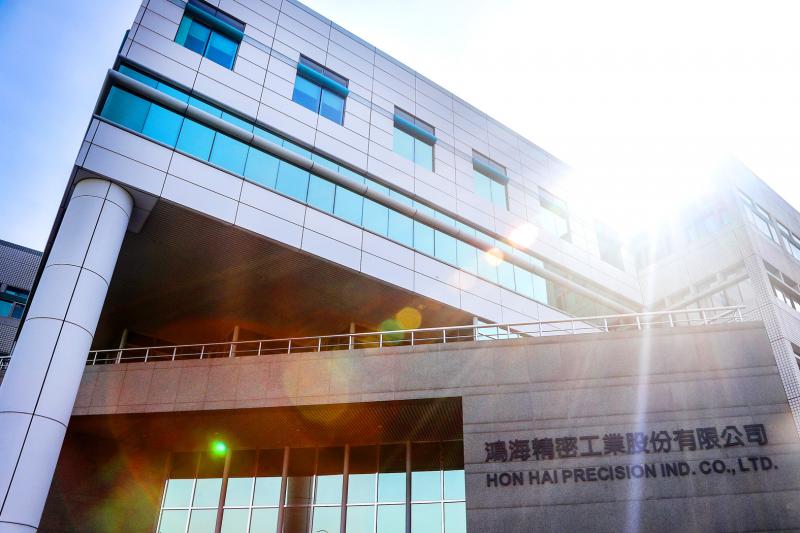Hon Hai Precision Industry Co (鴻海精密) this week plans to issue US$700 million in overseas convertible bonds at a negative interest rate.
It would be the first time Hon Hai sells bonds at a negative rate in a market awash in liquidity, cutting financial burdens shouldered by many enterprises in their borrowing costs.
Hon Hai, an essential iPhone assembler for Apple Inc, said the proceeds from the bond sales will be used to pay for the company’s purchases of raw materials from overseas markets to lower interest payments.

Photo: CNA
According to Hon Hai, the convertible bonds, which are scheduled to be listed on the Singapore Exchange on Thursday, have been priced with a zero coupon rate of minus-0.41 percent, with maturity at five years on Aug. 5, 2026.
The convertible price has been set at NT$163.17, which represents a 48 percent premium over Hon Hai shares’ closing price of NT$110.00 on the Taiwan Stock Exchange on Friday.
Hon Hai said that if investors convert all of the bonds they hold after maturity, the company’s paid-in capital will be diluted by only 0.86 percent, which is unlikely to impact existing shareholders significantly.
Despite the negative rate, Hon Hai’s convertible bond sale attracted many foreign investors, market sources said, adding that the bonds have been more than three times oversubscribed with their pledges topping US$2.2 billion in total.
The sources said the strong interest from foreign investors indicates they have faith in Hon Hai’s prospects by transforming itself from a contract manufacturer into a company capable of integrating its hardware and software strengths.
Hon Hai has scheduled an investors’ conference for Aug. 12, as the market is awaiting the company’s latest developments in electric vehicles and semiconductors.
The company could begin mass production of the next-generation iPhone, likely called the iPhone 13, in September. Apple accounts for more than 40 percent of Hon Hai’s total sales, as its production site in Zhengzhou, China, comprises more than 50 percent of iPhone production.
Separately, electronic component maker Lite-On Technology Corp’s (光寶科技) board of directors on Thursday approved a cash dividend of NT$2 per share for earnings made in the first half of this year.
The company reported net profit of NT$8.3 billion in the first half of the year, with earnings per share (EPS) of NT$3.57, up 65 percent year-on-year.
The company said EPS reached NT$1.74 in the second quarter, down from NT$1.83 in the first quarter.
The company’s board also agreed to start a stock buyback program on Friday, aiming to repurchase 40 million shares on the open market. It proposed spending up to NT$3.58 billion in the buyback program, which will continue through Sept. 29, it said.
Additional reporting by Angelica Oung

Taiwan Semiconductor Manufacturing Co (TSMC, 台積電), the world’s biggest contract chipmaker, booked its first-ever profit from its Arizona subsidiary in the first half of this year, four years after operations began, a company financial statement showed. Wholly owned by TSMC, the Arizona unit contributed NT$4.52 billion (US$150.1 million) in net profit, compared with a loss of NT$4.34 billion a year earlier, the statement showed. The company attributed the turnaround to strong market demand and high factory utilization. The Arizona unit counts Apple Inc, Nvidia Corp and Advanced Micro Devices Inc among its major customers. The firm’s first fab in Arizona began high-volume production

VOTE OF CONFIDENCE: The Japanese company is adding Intel to an investment portfolio that includes artificial intelligence linchpins Nvidia Corp and TSMC Softbank Group Corp agreed to buy US$2 billion of Intel Corp stock, a surprise deal to shore up a struggling US name while boosting its own chip ambitions. The Japanese company, which is adding Intel to an investment portfolio that includes artificial intelligence (AI) linchpins Nvidia Corp and Taiwan Semiconductor Manufacturing Co (TSMC, 台積電), is to pay US$23 a share — a small discount to Intel’s last close. Shares of the US chipmaker, which would issue new stock to Softbank, surged more than 5 percent in after-hours trading. Softbank’s stock fell as much as 5.4 percent on Tuesday in Tokyo, its

COLLABORATION: Softbank would supply manufacturing gear to the factory, and a joint venture would make AI data center equipment, Young Liu said Hon Hai Precision Industry Co (鴻海精密) would operate a US factory owned by Softbank Group Corp, setting up what is in the running to be the first manufacturing site in the Japanese company’s US$500 billion Stargate venture with OpenAI and Oracle Corp. Softbank is acquiring Hon Hai’s electric-vehicle plant in Ohio, but the Taiwanese company would continue to run the complex after turning it into an artificial intelligence (AI) server production plant, Hon Hai chairman Young Liu (劉揚偉) said yesterday. Softbank would supply manufacturing gear to the factory, and a joint venture between the two companies would make AI data

DOLLAR SIGNS: The central bank rejected claims that the NT dollar had appreciated 10 percentage points more than the yen or the won against the greenback The New Taiwan dollar yesterday fell for a sixth day to its weakest level in three months, driven by equity-related outflows and reactions to an economics official’s exchange rate remarks. The NT dollar slid NT$0.197, or 0.65 percent, to close at NT$30.505 per US dollar, central bank data showed. The local currency has depreciated 1.97 percent so far this month, ranking as the weakest performer among Asian currencies. Dealers attributed the retreat to foreign investors wiring capital gains and dividends abroad after taking profit in local shares. They also pointed to reports that Washington might consider taking equity stakes in chipmakers, including Taiwan Semiconductor